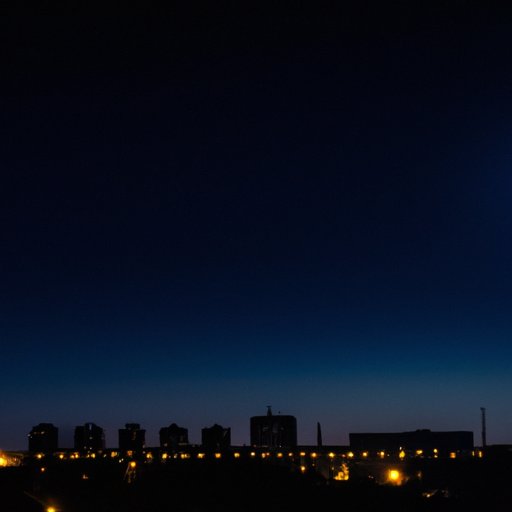Introduction
Have you ever stared up at the night sky and realized you could only see a few stars? Or maybe you’ve noticed that you can no longer see the Milky Way from your backyard. All of this can be attributed to a growing phenomenon known as light pollution. In this article, we’ll explore what light pollution is, how it works, and its impact on our environment, health, and nighttime view. This article will also include tips and suggestions for reducing light pollution in our communities.
Shedding Light on Light Pollution: How It Affects Our Environment and Health
Light pollution may seem like a minor inconvenience, but it has significant effects on our environment. Human-made light disrupts natural cycles and affects plant and animal behavior, migration, and reproduction. In addition, bright lights attract insects, which can harm ecosystems by disrupting food webs.
Light pollution also has detrimental effects on our health and wellbeing. Exposure to artificial light at night can disrupt our circadian rhythm, leading to sleep disturbances, compromised immune systems, and increased risk of chronic diseases, such as obesity, diabetes, and depression.
It’s not just the physical act of seeing light that affects us; it’s also the color and frequency of light. Blue wavelengths of light suppress melatonin production, the hormone that regulates our sleep-wake cycle. This suppression causes our bodies to stay awake longer, leading to a decrease in overall sleep quality.

The Cost of a Brighter Sky: How Light Pollution Obstructs Our Nighttime View
Light pollution doesn’t just affect our environment and health; it also obstructs our nighttime view. Excessive light from cities and other human-made sources makes it difficult to observe stars and celestial objects, and limits the number of visible stars in the night sky.
One solution is to reduce the amount of light pollution in our communities. We can do this by installing light fixtures that direct light downwards instead of upwards, using shields or covers on fixtures to prevent light from escaping, or by using low-wattage bulbs. Another suggestion is to limit outdoor lighting during certain hours or to use motion sensors to reduce light when it’s not necessary.
The Dark Side of City Lights: How Urbanization Contributes to Light Pollution
Urbanization is one of the main contributors to light pollution. As cities grow, more and more lights are added, creating a perpetual cycle of light pollution. The need for security lighting and the increasing popularity of outdoor lighting in commercial and residential buildings have also contributed to the problem.
However, we can all take steps to reduce light pollution in our surroundings. For instance, we can adjust the direction of lights or use timers to control when lights switch on or off. We can also urge local authorities to install energy-efficient lighting in public spaces.
Beyond the Bling: How Light Pollution Affects Wildlife and Ecosystems
Did you know that insects are attracted to artificial light like moths to a flame? This attraction can lead to lower biodiversity in the areas affected by light pollution, as insects are an important food source for many nocturnal animals. Birds can also be affected by light pollution, as it can disorient them and interfere with their migration patterns.
Reducing light pollution can have a significant impact on wildlife and ecosystems. For instance, using amber or red-colored lights enables animals to see without being attracted to them. Shielding lights and directing them downwards can also reduce the negative impact on animals and plants.
Nighttime Lights and the Human Circadian Rhythm: How Light Pollution Disrupts Our Sleep
Light pollution can affect our ability to fall asleep and stay asleep. Our bodies are programmed to sleep when it’s dark and be awake when it’s light. However, artificial lights can disrupt this natural cycle by tricking our bodies into thinking it’s still daytime. This, in turn, can affect our circadian rhythm, which regulates our sleep-wake cycle.
There are several steps we can take to mitigate light pollution’s impact on our sleep. First, we can minimize nighttime light exposure by turning off all electronic devices and avoiding bright screens before bedtime. Secondly, we can use curtains, shutters, or blinds to block out any external light. Lastly, we can use red or amber light bulbs, as they have less effect on melatonin production.
Stargazers vs. City Lights: A Look Into the Ongoing Debate About Light Pollution
There is an ongoing debate about light pollution and its effects on our environment, health, and nighttime view. On one side of the debate, stargazers and astronomers argue that the dramatic increase in light pollution has made it almost impossible to observe the stars and galaxies in the night sky. On the other side are city officials, who argue that bright lighting is necessary for public safety and crime prevention.
One potential solution to this ongoing debate is the adoption of smart lighting systems, which can adjust the brightness according to the time of day and the presence of people. These systems not only help reduce light pollution but also save energy by being active only when necessary.
Conclusion
In conclusion, light pollution is an increasingly significant problem that affects our environment, health, and nighttime view. Understanding the science behind light pollution and its impact on our current quality of life is crucial in finding sustainable solutions. By taking proactive steps to reduce the amount of artificial light we use, we can create a healthier environment for both ourselves and the wildlife and plants with which we share the planet.
Let’s all work together to reduce light pollution and ensure that future generations will be able to enjoy the beauty of the natural world and the wonder of the universe from a dark, star-filled sky.
(Note: Is this article not meeting your expectations? Do you have knowledge or insights to share? Unlock new opportunities and expand your reach by joining our authors team. Click Registration to join us and share your expertise with our readers.)
